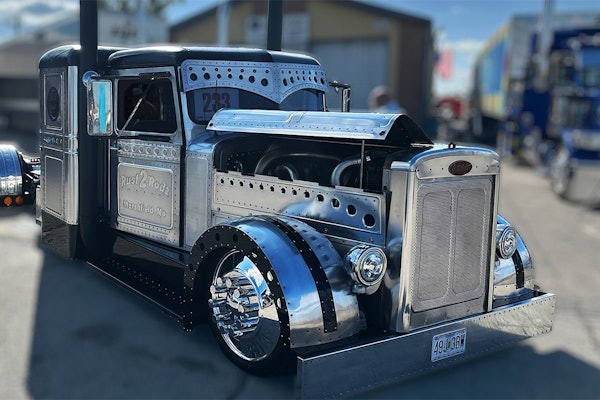
 Click here to see the “Suicide by truck” series. In it, we examine the largely undocumented incidents of pedestrians and four-wheelers who choose speeding trucks as an instrument of suicide. It also looks at how these suicides and suicide attempts affect innocent truckers, many of whom struggle with guilt or horrific memories.
Click here to see the “Suicide by truck” series. In it, we examine the largely undocumented incidents of pedestrians and four-wheelers who choose speeding trucks as an instrument of suicide. It also looks at how these suicides and suicide attempts affect innocent truckers, many of whom struggle with guilt or horrific memories.Two days after starting my first real job, I was driving below the speed limit in a residential neighborhood when a dog ran headfirst into my front right tire. I put the bloodied Labrador retriever and his whole human family in my car and drove them to the animal hospital.
On the way there, one of the kids mentioned that the unleashed dog ran into cars all the time. Nevertheless, I was devastated. The dog lived, I paid the bills and to this day, when I see a dog on the side of the road, I relive the thud of impact and the rush of adrenaline that turns my body into Jell-O.
I have wondered about the randomness of the event. What if I had left work a few minutes later? The lack of blame comforted me: I was driving slowly, fully alert in a well-maintained vehicle. There really was nothing I could have done differently, and yet, I thought about that pup for years.
Click here to see the ‘Suicide by truck’ series.
Fast-forward to last January. I had never heard of suicide by truck before I read about Leelah Alcorn, a transgender teen who killed herself by walking in front of a semi in the middle of the night. Her suicide note went viral on social media shortly after she died.
While Leelah’s story was heartbreaking, I was curious about the trucker. Few news reports mentioned his name or gave an update on how he was doing other than that he was exonerated. The media frenzy focused on the teen’s struggle with gender identity and parental conflict, so I was stunned when one Reddit thread turned its wrath toward the trucker and began blaming him. One comment said, “May the transphobic driver who ended your life rot in hell. Seriously, how is that F**ker no in jail yet????”

A few truckers jumped in and tried to explain how a truck can’t stop on a dime if someone steps in front of it, but the commenters continued to show mind-boggling ignorance about trucks and truckers.
As I continued reading, it became obvious that suicide by truck was well known within the trucking community. Long-time truckers either heard stories about possible attempts or had experienced near-accidents that had no other explanation. The intersection of social media and dash cams pushed the tragedies into the limelight.
Still, while I was able to find similar incidents online and gruesome videos on YouTube, it wasn’t until Adam Lowry agreed to talk to me that my story got legs.
As Adam told me his experience, I got a lump in my throat. He told it gently, but from the heart, with the details so clear it was like he was reliving the event.
Though Lowry, like other drivers I spoke with, was relieved to have done everything under his control to prevent the incident, the emotional devastation was difficult to fathom. He was in shock, but grateful for the extreme compassion his fleet, other truckers, the police and social workers showed him. Afterward, he couldn’t even bear the thought of getting behind the wheel of his own car, not to mention driving a truck. By the time this story went to print, he was driving professionally again, but the emotional scars will always be with him.
Other drivers with similar experiences wanted to move on and get right back on the road. All of them, though, were mystified by the randomness of the event, repeatedly asking themselves, “Why me?”
Suicide experts point out that the suicidal person is not thinking about the trucker. The truck is simply a means to an end.
These stories remind us that we are never completely in control of our world. Certainly not the world of a trucker, who encounters hundreds of strangers in speeding vehicles every day. In the words of Wade Schimmelpfennig, “My driving skills were put to the ultimate test.”
I came away with huge respect for the unwilling participants of these tragic events and a heightened sense of my own driving behavior. These guys could not have maintained control of their rig if they had been distracted or sleepy, or if their equipment was not in good condition. Their outcomes could have been much worse if they had not been on top of their game.
There’s no way to fully prepare yourself for this kind of tragedy, but being at your very best, all the time, gives you an edge.











